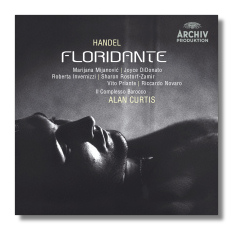
The Internet's Premier Classical Music Source
Related Links
- Handel Reviews
- Latest Reviews
- More Reviews
-
By Composer
-
Collections
DVD & Blu-ray
Books
Concert Reviews
Articles/Interviews
Software
Audio
Search Amazon
Recommended Links
Site News
 CD Review
CD Review
George Frideric Handel

Il Floridante, HWV 14
Joyce DiDonato, mezzo-soprano
Roberta Invernizzi & Sharon Rostorf-Zamir, sopranos
Marijana Mijanovic, contralto
Riccardo Novaro & Vito Prianti, baritones
Il Complesso Barocco/Alan Curtis
Archiv Produktion 477656-6 3CDs
Handel's thirteenth opera, Floridante, was first performed in 1721 at the King's Theatre in the Haymarket, London. Its libretto by Rolli was based on Silvani's La costanza in trionfo. But of course the production history of Floridante is not so simple: Handel often revised his operas as their number grew, as he got older and as opportunities for re-staging them with new performers under different circumstances grew. But Floridante's story is even more involved and this welcome new version helps to compensate (to us) for the compromises Handel had to make. There are four versions of Floridante as the composer is actually known to have produced it. The version presented here is an attempt to recreate as accurately as possible just what Handel truly first intended. It's successful.
Handel's professional status was under threat at the time he composed and staged Floridante: Giovanni Bononcini, another composer in residence at the Royal Academy of Music (London's main opera company), had the advantage of being Italian at a time when Handel was trying to emphasize "drammi per musica', Italian "reform operas'. In the 1721-22 season Bononcini's operas (with styles that were preferred by audiences) received four or five times as many performances as Handel's. Things were made more difficult by the fact that Rolli considered himself enough of a poet to make it his business to try and outdo Silvani. What's more, several of the singers identified by Handel were unavailable for one reason or another. As well as much transposition, this meant some fundamental rewriting – Elmira became a contralto role, for example, and Rossane a soprano one. He also changed some of the characterization to contrast with the way Bononcini had written for some of the same singers whom Handel now had to use. Remember that singers usually had more prestige than composers in the world of eighteenth century opera.
In 1991 Alan Curtis issued a recording of highlights from Floridante where all the numbers in which Elmira appears were performed as in the original score; where no such version exists, Curtis transposed the numbers himself. This relatively short Handel opera is set in ancient Persia and has some similarities of plot (betrothals despite political enmity, supposed offspring revealed as adopted, banishment and intrigue, disguise, separation) as Verdi's operas, say. It does have a happy ending, right triumphs and virtue is rewarded. Although in places contrived and with characters less fully drawn in order to explain emotions (Oronte's dishonesty, yet compassionate nature, for example) than such emotions call for, Floridante has much engaging music and some beautiful arias.
It would be hard to make a convincing case for Floridante to be considered one of Handel's greatest operas, one of his most compelling even. But it is a splendid vehicle for the singers and players as assembled on this recording. In particular Joyce DiDonato's Elmira, the supposed daughter of Oronte and in the end Floridante's spouse, is the center of our admiration for her characterful singing the charismatic dramatic presence she brings to the role. It would be verging on the uncharitable to say that the opera needs to be swept along by a brisk and lively orchestra co-ordinated by a businesslike, though, sensitive conductor. Yet that, too, is what we get. The playing is superb. Things never drag – indeed, you're inspired to listen again and try and extract more from the opera and let the histrionics of the plot take second place to its attention to flawed humanity and faith that good will eventually out; perhaps if we weren't already familiar with Fidelio, Aida, Rigoletto…
Aside from Curtis extracts CD (CBC SMCD5110), the only other recording is McGegan's with Capella Savaria on Hungaroton 31304/6; of the two this latest release, also significantly cheaper, is to be preferred. It's recorded on period instruments, of course, with a' at 415 Hz and does have the advantage of being closer to Handel's original intention. The booklet contains the text and some background, though not always as sophisticatedly-written as one would hope. The opera deserves to be better known, does contain some touching and sublime moments, is a great vehicle for the principles and provides interesting insight into the machinations, if not really of the workings of ancient Persia, then of early Georgian opera and the extent to which Handel was and was not prepared to compromise in suiting singers and music. Floridante will certainly appeal to collectors of Handel's operas: it should become the definitive recording. For lovers of the wider repertoire, it's attractively-enough performed and has enough good music to recommend it in its own right.
Copyright © 2007, Mark Sealey





















